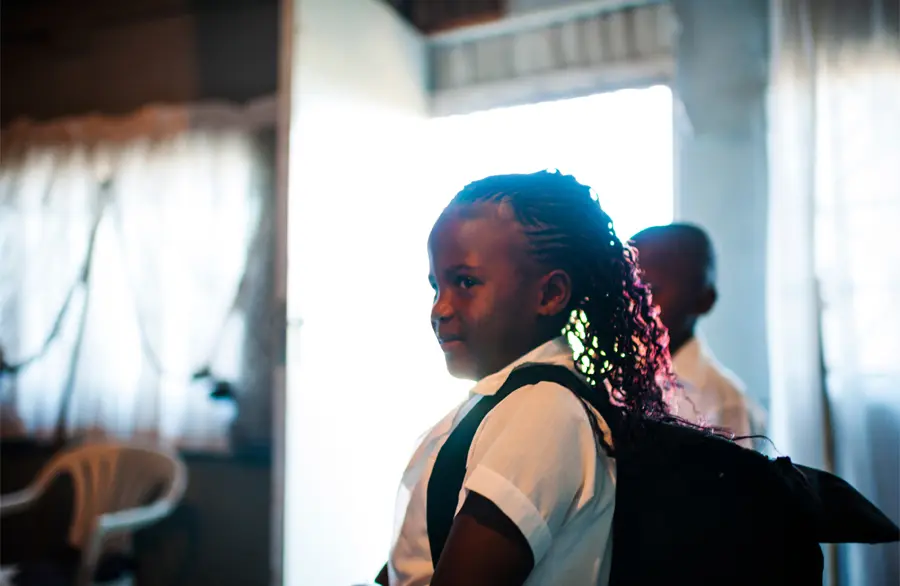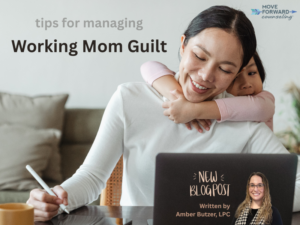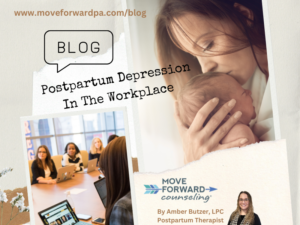With the start of the school year just a few weeks away you and/or your child may be feeling some back-to-school anxiety. This upcoming school year will again be different than past years bringing a whole flood of emotions. Not to mention, for those who spent all of last year at home learning, the transition back might be a bit challenging.
The underlying emotion of anxiety is uncertainty. And, boy have we had a lot of that these past many months. It is hard to know what things will look like come New Year’s or next Spring. What we do know is changing week-by-week, day-by-day. Whatever you are feeling right now, it’s ok. There is no “normal” way to feel as school begins. You might be scared about you or your child getting sick with Covid-19. You might be worried about how quarantine rules may impact your job. You might feel strongly one way or another about your child wearing masks or getting vaccinated. Your child might be fearful to return to in-person learning. He/she/they may not know how to be social in the same ways as before. It is all a lot.
If you are feeling a lot, or a little, back-to-school anxiety — what are some things you can do? Combating back-to-school anxiety may feel overwhelming but there are some ways to help ease emotions and make the transition a bit easier.
Here are some tips for combating back-to-school anxiety:
1.) Recognize and validate feelings — Your child may be feeling anxious but not know how to verbalize those feelings. Look for signs in their behavior that may indicate they are struggling, things like crying, complaining of stomachaches, irritability, or clinginess. Validate those feelings by telling them you know it might be hard, they might be scared, and that is ok. Tell them you know they can do it and you will get through it together. The same goes for yourself — allow yourself to feel whatever it is you are feeling. And, know that is ok not to be ok.

2.) Be aware of your actions/emotions around your child — We all have moments of struggle but it is important to be mindful when you are around your child. Your emotions, the words you say, can all impact how your child is feeling. Try to stay positive around him/her/they and keep your negativity to private conversations. You are setting an example for your child. If you are frequently verbalizing your fear over your child returning to in-person learning, then your child will likely be afraid as well. This is a great time to model positive coping skills for your child. If you tell them you are also afraid, show them how you are coping with it — focusing on the positive, taking deep breaths, etc.
3.) Teach your child about mindfulness — Mindfulness can be a great tool to combat anxiety. If your child, or yourself, are experiencing moments of anxiety teach them how to pay attention to where they are currently rather than letting their thoughts run away. Teach your child to identify when they are feeling scared or sad and then give them a coping solution— find a friend, talk to a teacher, breathe, walk to the bathroom, count to 10, feel the fabric of their shirt between their fingers, etc. These are skills that they can take with them throughout life.
4.) Get a head start on routines — The normal routine fell by the wayside last year when kids didn’t have to catch the school bus or log in to computers until later in the day. Prepare your child a week or so before school to change up their routine. Start getting up early, getting ready, and leaving the house to do other things so they aren’t caught off guard the first week of school.

5.) Send your child with a memento or note from you — Putting notes in your child’s lunchbox, a family photo, or a special keychain, can help provide some calm and connection for you and your child during the day. If they get upset they can reach for the memento to calm them down.
6.) Take note of your concerns and develop solutions — This is a tricky time for parents. What is the right thing to do for your child? Should you make them wear a mask even if the school doesn’t require it? What about vaccines? Should you be sending your child at all? Can they participate in sports or is it too dangerous? Take some time to think through your concerns and your options. Talk it out with a significant other, a trusted friend, and your child. Develop a plan or solution that works for your family.
7.) Communicate with school officials — If your child is having a particularly hard time, tell the teacher. If you develop a plan, let the teacher in on it. Reach out to social workers and nurses so that everyone is on the same page. Maybe even arrange a weekly check-in meeting so you can get more information about how your child is doing and ease your worries.
There is no doubt this year will again pose many challenges for families as they face back-to-school anxiety. Just remember this situation is always changing and these struggles won’t last forever. If you are struggling with how to cope, you may consider reaching out to a licensed mental health professional or counselor for tools that fit your life. You are not alone.
Ready to begin counseling in Pennsylvania?
Our professionally-trained and licensed counselors have openings. Just call our office at 717-462-7003×1 and speak to our administrative assistant to get started to feeling better. You can get the tailored help you need right now. We are here for you.




























